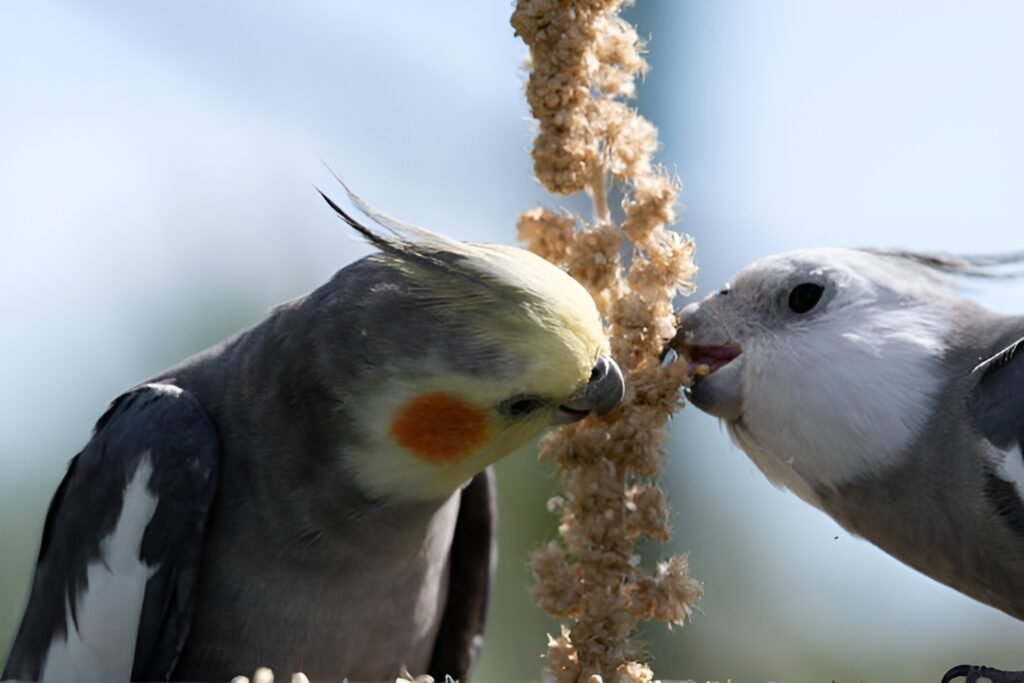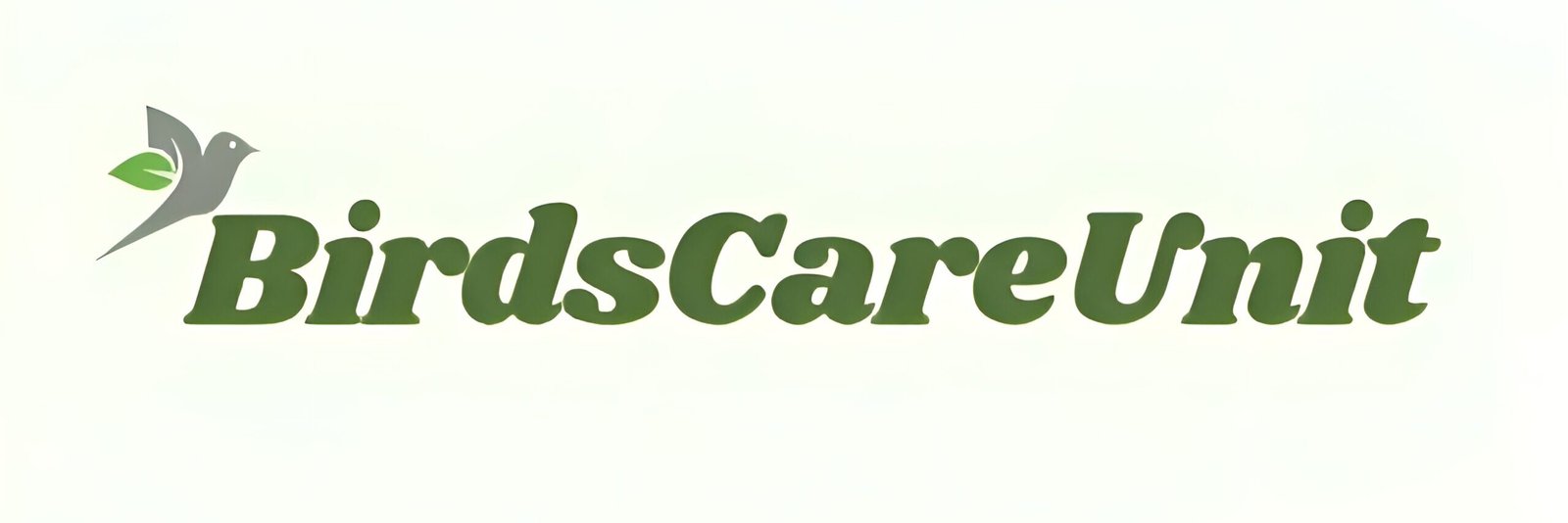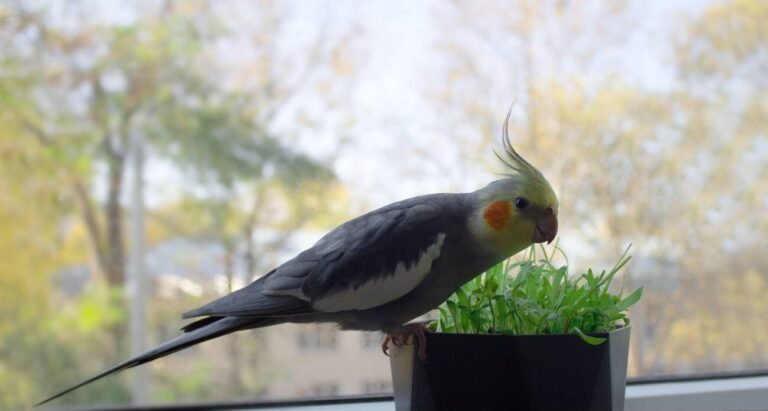What can Cockatiel eat as a treat?

I breed cockatiels and lovebirds together, but my heart belongs to cockatiels. Known for their playful personalities, sweet songs, and vibrant plumage, these medium-sized parrots quickly become cherished family members.
Just like humans, cockatiels enjoy tasty treats from time to time. However, it’s essential to offer snacks that delight their taste buds while contributing to their overall health and well-being. Selecting safe and nutritious treats is crucial to ensuring your feathered friend thrives. With the right balance of fruits, vegetables, and healthy snacks, your cockatiel will remain happy and active. In this blog post, we’ll explore a variety of safe and delicious treats for your cockatiel, along with tips on offering them in moderation and avoiding harmful foods. Let’s dive into the world of cockatiel snacking!
Fruity Delights: A Sweet and Nutritious Treat
Fruits are a favorite treat among cockatiels, providing a delicious burst of flavor while being packed with essential vitamins and minerals. Here are some fruits that are safe and healthy for your cockatiel:
- Apples (seedless): A great source of vitamins A and C. Always remove the seeds, as they contain small amounts of cyanide harmful to birds.
- Grapes (seedless): Juicy and rich in antioxidants, grapes are loved by most cockatiels. Cut them into bite-sized pieces.
- Bananas: High in potassium, bananas are soft and sweet, making them an easy-to-eat treat.
- Berries (strawberries, blueberries, raspberries): These antioxidant powerhouses are small, juicy, and perfect for a quick snack.
- Apricots: Rich in vitamins and fiber, apricots are tasty, but remember to remove the pit.
Fruits should always be given in moderation due to their high sugar content. When offered occasionally, they provide your cockatiel with a burst of energy and essential nutrients.
Vegetable Variety: Adding Crunch and Nutrition
Vegetables are an excellent option to diversify your cockatiel’s diet. Typically lower in sugar than fruits, they offer a range of vitamins, minerals, and antioxidants. Here are some of the best veggies to offer:
- Carrots: Crunchy and rich in vitamin A, they promote eye health and boost the immune system. Offer raw or lightly steamed.
- Spinach: A powerhouse of nutrients, spinach supports bone health and overall vitality.
- Broccoli: Nutrient-dense, broccoli provides vitamin C, fiber, and calcium, making it a fun and healthy treat.
- Sweet Potatoes: Packed with beta-carotene and vitamin C, these can be cooked and mashed before offering.
- Bell Peppers: Available in various colors, they are high in vitamin C and add color and flavor to snack time.
Ensure all vegetables are fresh and free of pesticides. Introducing a variety will keep your cockatiel excited about mealtime!
Herbal Indulgence: Adding Flavor with Fresh Herbs
Fresh herbs can introduce new flavors and smells that stimulate your bird’s senses. Here are a few safe herbs to offer:
- Parsley: Packed with vitamins C and K, parsley adds zest to their diet. Offer in moderation.
- Cilantro: Its fresh flavor makes cilantro an interesting and safe herb for nibbling, providing beneficial phytonutrients.
- Basil: This fragrant herb offers anti-inflammatory properties that support immune health. Serve small amounts as a refreshing treat.
Ensure all herbs are fresh and free from pesticides or chemicals. Herbs can be a fun way to change up your bird’s diet and keep them interested.
Grain Goodness: Wholesome and Energy-Boosting Snacks
Cooked grains are a wholesome option for your cockatiel’s snacking pleasure. They are easy to digest and provide energy. Here are a few grains you can offer:
- Rice (preferably brown or wild): A good source of fiber and carbohydrates; ensure it is cooked and served in small portions.
- Quinoa: Packed with protein and essential amino acids, it should be cooked and cooled before serving.
- Oats: Soft and wholesome, cooked oats offer fiber and vitamins. Serve in small amounts as a snack.
Grains should be cooked and offered in moderation to prevent overeating, providing slow-release energy beneficial for keeping your bird active.
Protein Powerhouses: Building Strong Muscles
Protein is essential for your cockatiel’s diet, especially for muscle health. Incorporating small amounts of protein-rich foods as occasional treats can be beneficial:
- Cooked Eggs: A great source of high-quality protein, offer small, chopped portions of boiled eggs.
- Legumes (like lentils or beans): Good sources of plant-based protein; ensure they are fully cooked and unseasoned.
Offer proteins sparingly, as too much can cause imbalances, but a little egg or legumes now and then can support your bird’s strength and vitality.
Seed Sensation: A Favorite Treat in Moderation
Seeds are a beloved treat among cockatiels, but it’s vital to offer them in moderation. They are tasty but high in fat and lack essential nutrients. Here are a few seeds to offer as special treats:
- Millet: A favorite snack, millet sprays provide a fun, crunchy texture. Be careful not to overdo it.
- Sunflower Seeds: While loved, these seeds are high in fat. Offer them sparingly as a reward or treat.
Seeds can be part of a balanced diet but should be supplemented with pellets, fruits, and vegetables to ensure your bird gets all necessary nutrients.
Treat Tips: Guidelines for Offering Healthy Snacks
When offering treats to your cockatiel, keep these guidelines in mind to maintain a balanced diet and ensure health:
- Moderation is Key: Treats should make up no more than 10-15% of your cockatiel’s diet to avoid weight gain and nutritional imbalances.
- Variety is Important: Rotate and vary treats to prevent boredom and ensure a wide range of nutrients.
- Freshness Matters: Ensure treats are fresh and free from mold. Stale or spoiled food can make your cockatiel sick.
- Avoid Harmful Foods: Certain foods are toxic to birds, such as avocado, chocolate, caffeine, and salty or fatty foods.
By following these tips, you can offer your cockatiel a variety of safe and nutritious treats, keeping them healthy and happy.
Conclusion: A Balanced and Happy Life for Your Cockatiel
Offering treats to your cockatiel is a delightful way to bond, provide enrichment, and add variety to their diet. By incorporating a range of fruits, vegetables, grains, and proteins, while keeping seeds and fatty treats in moderation, you can ensure your cockatiel enjoys snack time while staying healthy.
Remember, treats should be given sparingly and not replace a balanced diet of high-quality pellets and fresh vegetables. A happy, healthy cockatiel is one that receives proper nutrition, plenty of attention, and lots of love. So go ahead, spoil your feathered friend with some delectable delights—they’ll thank you with cheerful chirps and affectionate cuddles!



